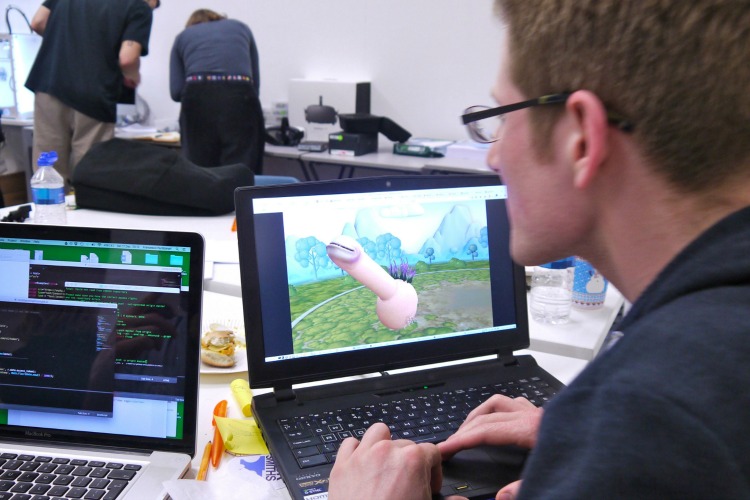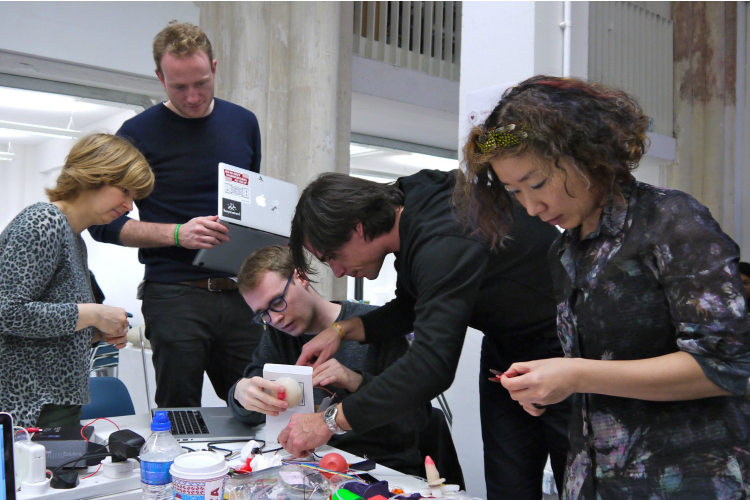At the first Sex Tech Hack, a hackathon on sexuality in London
Published 20 December 2016 by Elsa Ferreira
On December 17 and 18, at Goldsmith University, in Great-Britain, took place the first hackathon to thwart the relations between sex and technology. Report.
London, from our correspondent (text and photos)
“It’s fascinating like when when you change the settings, something that should have been exciting become hilarious.” Francesco Pertigrari, music and computer science student, and his three co-hackers are taking part in their first hackathon. “It’s the first time we have been talking about sex so much with strangers,” says Simon Crowe, studying digital culture.
A few hours ago, these co-hackers didn’t know each other. Now they are scanning together images of porn films, MILFs and other “squirting” (feminine ejaculation), “unconventional” practice in the process of being prohibited from porn websites by the British government in virtue of the bill on digital economy, says Carleigh Morgan, other participant of the hackathon. “Excuse me? What?”, interrupts Francesco. The conversation starts.

We are at the Sex Tech Hack, first hackathon in its kind organized in the United-Kingdom and set up by the Goldsmith students technology club, Hacksmith. “A hackathon on intimacy, companionship and sexuality with an artificial partner,” explains Kevin Lewis, one of the main instigators of the event, organized before the international conference Love and Sex with Robots that was held on December 19 and 20 at Goldsmith University.


For the occasion, fifty or so hackers, designers, researchers and students gathered in an old campus church. A heterogeneous audience and mainly 50% “non-masculine”, rejoices Kevin. “It’s brilliant because we didn’t make any particular effort to achieve this result, it just happened.” Here the focus is on inclusion. Everywhere, the code of conduct is displayed.
Vibrator passion
Before the practice, the theory: presentation of sex-toys and discussion on the future of sex and technology with Kate Devlin, teacher at Goldsmith and co-organizer of the hackathon. “We talked about materials, how to exploit neurological activity, how to bring into play the body odor. We also talked about the perspective of the elderly or people with disabilities.” Specialized in computer science and artificial sexuality, it was she who brought the conference to London when it was forbidden in Malaysia, she says. “Too extreme.”
We also met Rob Blake, a hacker who has been passionate about vibrators for years “because there are so many badly drawn objects,” he regrets. He is roaming the world to attend conferences on the subject, such as the nomadic festival Arse Elektronika. His team is busy diverting a child’s toy to turn it into a very (too?) powerful remote control for a vibrator. Award for the most fun tech for this object for two to play or in teams.
John (more reserved, he did not give us his real name) wishes to “remove the barriers and stigmatizations attached to masculine sex-toys”. While waiting for the male equivalent of Sex and The City, that popularized the Rabbit for a generation at least, John has a strategy: you first need to get men to use toys in their couples so that they realize there is no harm in taking care of yourself.
Soft robot on boob
Once the taboos are lifted, time for fun. Sarah Wiseman invents a portable technology, here in the form of a zipper, that allows you to indicate to your partner if you share his or her fantasy (it opens), without revealing if he or she does not share yours (it doesn’t open). Same principle with John Dior who set up a dating application based on sexual eccentricities.
Sex is experimental too, as with Peacock that detects vaginal humidity to trigger the opening of a paper ornament inspired from the peacock’s tail – after all, men have the erection, justify the inventors. A nice metaphor that wins the award of the best hack in the conceptual category. Or still the Love Pad, winning all categories, lead by a team of researchers and teachers from Goldsmith and the Royal College of Art. Their sex toy is triggered from a distance and can incorporate computational learning to react and adapt to the user’s taste. All in a soft robotics material, developed by Caroline Yan Zheng, PhD student at the Royal College of Art. Titillate the silicon boob, a small soft robot placed on your partner’s chest starts to vibrate, clasp, pinch.

“Fuck the system”
And what if having sex could also be political? Back to the table where they are talking about feminine ejaculation. Their hack, designed among other things to get round the censorship, consists in associating to the most frequented pornographic searches on the Web (data that Pornhub loves to distill) the most popular queries in other categories, and mixing the key words associated to the pictures. A picture of lesbian porn (most searched for category) could thus appear in the middle of photos of Jeremy Corbyn (the most searched for politician on Internet at the same time).


Side project, Ride the Market, Fuck the System, exploits historical financial data (the subprime crisis in 2008, the fall of the pound post-Brexit or still the privatization of the Royal Mail, the British postal service) to convert it into vibrations and activate a fist printed in 3D. A way to experience the feeling of “being fucked by the system”.
More information on the first edition of Sex Tech Hack
